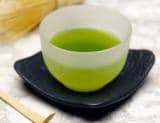Health Benefits of Matcha Tea
Matcha is a type of green tea that comes in powdered form. Matcha tea is prepared by whisking matcha powder with hot water, which forms a frothy liquid. Matcha powder is also sometimes used as an ingredient in foods and non-tea beverages (such as smoothies).
The health benefits of matcha tea exceed those of green tea because when you drink matcha you ingest the whole leaf, not just the brewed water. One glass of matcha is the equivalent of 10 glasses of green tea in terms of its nutritional value and antioxidant content. For maximum nutritional benefit, matcha tea is unparalleled.
What is matcha powdered green tea? Matcha is premium green tea powder from Japan used for drinking as tea or as an ingredient in recipes. While other green teas are grown throughout the world, matcha is unique to Japan. It is the heart of the Japanese way of tea and has been celebrated in the traditional Japanese tea ceremony for hundreds of years.
What does matcha taste like? Chlorophyll and amino acids give matcha its unique rich taste, an initial vegetal, astringent taste, followed by a lingering sweetness. Matcha made in the traditional Japanese style, whisked with water, is a full-bodied green tea. The intensity of the experience compares to one’s first taste of dark chocolate or red wine. When added as an ingredient, the taste of matcha becomes subtler. It adds the flavor and color of green tea to your creation, be it a smoothie, latte, savory sauce or pastry. What are the health benefits of matcha? Matcha is renowned for numerous health benefits. It is rich in nutrients, antioxidants, fiber and chlorophyll. It is sugar-free, an ideal drink for diabetics and others wishing to reduce their sugar intake. The health benefits of matcha exceed those of other green teas because matcha drinkers ingest the whole leaf, not just the brewed water. One glass of matcha is the equivalent of 10 glasses of green tea in terms of nutritional value and antioxidant content.One of biggest the buzz words in nutrition, antioxidants are naturally occurring chemical compounds that prevent aging and chronic diseases. Nowadays, a variety of fruits and vegetables are lauded for their antioxidant properties, leading to a host of products with all kinds of claims. But matcha is unparalleled in comparison. Firstly, matcha is packed with exponentially more antioxidants according to the latest innovation in antioxidant research. Using the testing method known as ORAC (oxygen radical absorbance capacity), experts at Tufts University discovered that matcha possesses an amazing twenty times more so than pomegranates or blueberries. Matchas ORAC rating is a mighty 1300 units per gram, compared to pomegranates 105 units per gram or blueberries 91 units.
Other health benefits of matcha:
- Is packed with antioxidantsincluding the powerful EGCg

- Boosts metabolism and burns calories
- Detoxifies effectively and naturally
- Calms and relaxes
- Enhances mood and aids in concentration
- Provides vitamin C, selenium, chromium, zinc and magnesium
- Fights against viruses and bacteria
- Is rich in fiber
- Lowers cholesterol and blood sugar
- Does not raise insulin levels

